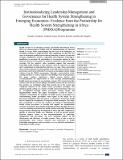| dc.contributor.author | Chepkorir, Jennifer | |
| dc.contributor.author | Agata, Naphtali | |
| dc.contributor.author | Kiambia, Nicholas | |
| dc.contributor.author | Nangehe, Brenda | |
| dc.date.accessioned | 2021-12-09T11:09:50Z | |
| dc.date.available | 2021-12-09T11:09:50Z | |
| dc.date.issued | 2021-11-15 | |
| dc.identifier.citation | Chepkorir, J., Agata, N., Kiambi, N., & Nangehe, B. (2021). Institutionalizing Leadership Management and Governance for Health System Strengthening in Emerging Economies: Evidence from the Partnership for Health System Strengthening in Africa (PHSSA)Programme. European Journal of Business and Management Research, 6(6), 47-52. https://doi.org/10.24018/ejbmr.2021.6.6.1132 | en_US |
| dc.identifier.issn | 2507-1076 | |
| dc.identifier.uri | https://repository.amref.ac.ke/handle/123456789/494 | |
| dc.description | This work is licensed under a Creative Commons Attribution-NonCommercial 4.0 International License.
The names and email addresses entered in this journal site will be used exclusively for the stated purposes of this journal and will not be made available for any other purpose or to any other party.
Submission of the manuscript represents that the manuscript has not been published previously and is not considered for publication elsewhere. | en_US |
| dc.description.abstract | Health systems in an emerging economy, specifically Sub-Saharan Africa (SSA) are characterized as fragile with low implementation of Universal Health Coverage. While acknowledging that the cause of the inadequacy in emerging economies is multi-factorial, other arguments are that the root cause is inadequate political and technical leadership. Evidence reveals that visionary, imaginative, decisive, responsible, and responsive leadership is insufficient to persuade all stakeholders in low-income nations in Sub-Saharan Africa to work together to attain the constructive goal of universal coverage. On the contrary, other academics suggest that successful leadership would establish a clear national vision for universal coverage and a commitment to achieving that objective over time. These contrasting observations motivated an interrogation of the link between health system governance and Universal Health Coverage in an emerging economy taking evidence from the PHSSA programme. Through a meta-analysis of the existing literature as well as analysis of the findings from the programme, the paper explores experiences, critical success factors and recommendations for improvement of UHC through institutionalizing health system governance in an emerging economy. The research provides evidence that the governance linkages in health systems and the outcomes they produce are contingent rather than assured, due to the variety and complexity inherent in the health system governance paradigm. The situation-specific setting of a country's health system determines what can be accomplished through health governance strategy design and implementation efforts. The paper recommends a need to create a conducive environment for adoption of health systems programmes by contextualizing health governance with regard to the larger set of governance institutions that surround it. A competency framework should also be adopted in recruitment of competent health managers. The study also recommends a need for the countries in seeking to institutionalize health system governance to develop and support an organizational structure and context that sustains leadership practices through advocacy, create an enabling environment for health systems leadership, management and governance through the development of ethics and other competences specific to universal health care situations as well as provide proper financial support system so that institutionalization of leadership, management and governance can have maximum impact on the effectiveness and efficiency of health systems. There is also a need to institutionalize short courses, seminars and conferences in health leadership, management, and governance so as to entrench participatory leadership in health systems. | en_US |
| dc.description.sponsorship | Amref Health Africa, Ministry of Health (Kenya), and the Japan International Corporation Agency (JICA | en_US |
| dc.language.iso | en | en_US |
| dc.publisher | European Journal of Business and Management Research | en_US |
| dc.subject | Emerging economies | en_US |
| dc.subject | Governance | en_US |
| dc.subject | Leadership | en_US |
| dc.subject | Management | en_US |
| dc.subject | Universal health coverage (UHC) | en_US |
| dc.title | Institutionalizing Leadership Management and Governance for Health System Strengthening in Emerging Economies: Evidence from Partnership for Health System Strengthening in Africa (PHSSA) Programme | en_US |
| dc.type | Article, Journal | en_US |

